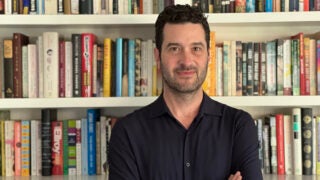
USC Price alumna named L.A.’s first homelessness coordinator
Meg Barclay will keep her eye on the big picture while bringing together partners from private and nonprofit sectors
Homelessness has become the defining issue in Los Angeles — impossible to ignore and requiring collaborative action to solve. Meg Barclay MPP ’04 is taking on a newly established role in those efforts as the city’s first homelessness coordinator.
Appointed by the Los Angeles City Council Homelessness and Poverty Committee, Barclay — who earned a Master of Public Policy from the USC Price School of Public Policy — recently began her new job to coordinate implementation of the city’s Comprehensive Homeless Strategy. Her role is to understand the plan and make sure civic efforts are implemented as adopted, and work with partners in L.A. County and in the private and nonprofit sectors to coordinate on shared efforts.
“Given the urgency of addressing homelessness in the city, I am pleased that a full-time coordinator has at long last been appointed,” said L.A. Council member Jose Huizar, vice chair of the committee, in a statement. “Our aim was to ensure that now and in the future, the city of Los Angeles has a designated person whose sole function is addressing homelessness day in and day out. We look forward to working with Meg Barclay to coordinate homelessness efforts across the city.”
Deep-rooted commitment
In her first job out of USC Price, Barclay served as project manager for the nonprofit Shelter Partnership, analyzing Los Angeles County’s homeless funding. She then joined the city of Los Angeles as a legislative analyst, staffing the committees on housing and homelessness.
She gained federal experience in 2010 at the U.S. Department of Housing and Urban Development, working for Assistant Secretary for Community Planning and Development Mercedes Márquez ’82. Part of her responsibilities at HUD also included working with USC Price Professor Raphael Bostic, who was serving as the assistant secretary for policy development and research at the time.
This is an issue I’ve cared about for a long time.
Meg Barclay
“This is an issue I’ve cared about for a long time,” Barclay said. “When I was getting my MPP, for projects where I could pick the subject matter, I would choose to look at affordable housing or homelessness whenever possible.”
Barclay credits her USC Price education with developing strong analytical tools — particularly through courses on economics with Professor Gary Painter and quantitative analysis with Professor Elizabeth Graddy, now the USC vice provost for academic and faculty affairs.
Painter noted that the economics class helps students think through problems in a systematic way comparing the incremental benefits of policy changes to the incremental costs.
“Meg is a great example of our alumni who can apply analytic thinking to real-world policy problems over and over again,” Painter said. “It’s clear that USC identifies homelessness as one of the issues it wants to contribute to finding solutions. Meg is going to play an integral leadership role helping to coordinate various stakeholders needed to come together to forge new solutions.”
Seeing the bigger picture
Barclay has spent the first few weeks on the job putting together the Comprehensive Homeless Strategy’s first quarterly report for the 2016-17 fiscal year that will soon be sent to the Homeless Strategy Committee.
“My goal is to help make the strategy as effective as it can be in solving this problem and helping departments get what they need to accomplish that,” Barclay said. “I think the exciting thing is that the city and county are working together on this issue in ways that would have been unimaginable when I first started working on this issue in 2004.”
One important thing to understand is that my job isn’t actually doing the work of ending homelessness.
Meg Barclay
Decreasing homelessness in Los Angeles is a monumental task. As she receives report-backs from the various departments, she can make recommendations regarding adjustments for what is and isn’t working. Barclay noted that her role will have its limitations, but she considers this is a critical effort and wants to contribute where she can.
“One important thing to understand is that my job isn’t actually doing the work of ending homelessness,” Barclay said. “It’s the operational departments and service agencies deploying resources allocated by the city council and mayor who are doing the actual work. The idea of this position is that somebody has their eye on the whole picture and knows where things are at any one point in time.”
“My strengths are being analytical and figuring out how to get things done in a government setting,” she added, “so this is where I can do the most good.”



